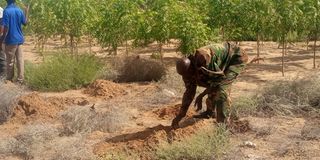Tourists to pay Sh20 to plant trees in Kenya

A Kenya Forest Service official plant a tree at Mission of Hope Turkana High School in Lodwar.
Every tourist visiting Kenya will soon be charged Sh20 for buying tree seedlings.
Dr Alfred Mutua, the Cabinet Secretary for Tourism and Wildlife, made the revelation on May 9.
Speaking during a reception hosted by the Australian High Commissioner to Kenya, Jenny Da Rin, to announce plans by an Australian tourism company, Intrepid, to expand in East Africa, Dr Mutua said his ministry was working on a framework that would see each tourist charged Sh20 for tree seedlings.
"Our plan as a government is that every tourist from any part of the world who visits Kenya will plant a tree. We are currently working on a plan through our ministry - the Tourism Board - where every tourist who comes into the country will be given a tree seedling to plant.
And we are saying that there will be a small fee of Sh20 charged to the tourist for the seedling. I think that's a small fee for any tourist to part with. We want them to plant a tree and they can monitor it every time they visit Kenya. We want at least one tree per tourist," Dr Mutua revealed.
Intrepid co-founder and chairman Darrell Wade unveiled the company's plans to spread its tentacles in Kenya and East Africa.
Last year, Intrepid helped 5,000 travellers explore East Africa, and Wade says the company aims to increase that number through several strategies that will include deepening its vertical integration to expand into areas such as accommodation to increase its presence in key countries in the region - Kenya, Tanzania, Uganda and Rwanda.
"East Africa is home to rich biodiversity and cultures. Through sustainable travel practices, visitors can engage responsibly with East Africa's natural wonders and leave a positive footprint for generations to come. Tourism activities must emphasise responsible practices that protect habitats and wildlife while supporting culture and promoting sustainable livelihoods within communities. Balancing economic growth with environmental and social concerns is critical, as is educating travellers about responsible behaviour and promoting community involvement in tourism planning and management," said Wade.
Speaking at the reception, the new Australian High Commissioner, Jenny Da Rin, noted that more than 22,000 Australians will visit Kenya in 2024.
"Our tourism-dependent communities here and in Australia rely on visitors for jobs and economic activity. It's in our interest that Kenya and countries in Africa provide a safe and secure destination for Australians who want to come here. They have a good experience, and that helps them understand Africa and the links between our countries," Da Rin said.
Since arriving in December, Da Rin says she has held talks with the Kenyan government about how the two countries can strengthen ties in mining, services, education, agriculture, health and tourism.
"To support these efforts, the Australian government has moved the Africa headquarters of the Australian Trade and Investment Commission, Austrade, to Nairobi and Australia's Trade Commissioner for Africa - Scott Morriss - is now based here.





